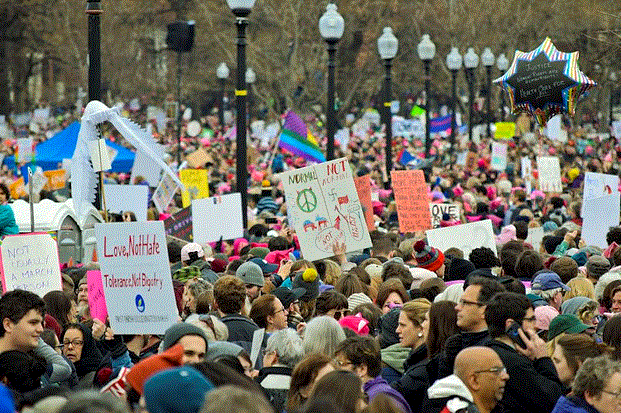
Recently I read that Polling matters more than ever and “Polling is an act of political resistance.” Good Lord, let’s hope not. Polling attracts more attention than it deserves and it certainly isn’t driving political resistance.
The arguments about polling were made in CommonwealthMagazine by MassINC pollster Steve Koczela, who polls for WBUR. Let’s start with the notion that polling is an act of political resistance. That would be a terrible matter if true – terrible for polling. To the extent that media polling has value, the notion that it performs for one side or another in conflict would be disabling.
The assertion is that polling is a tribune of a marginalized people, without which the disenfranchised masses would lack the capacity to speak truth to the president. Mr. Koczela writes:
Most of the political trends in recent years have been toward disempowerment of everyday voters. Polling pushes in the other direction. Public opinion polls collect the disparate voices of the people and turn them into an unignorable whole. In so doing, they take power from the top and push it downward, back from government to the people.
It’s an odd form of communication. It starts with a pollster (or hopefully) a paying media sponsor. Topics that attract public attention are a priority. That way, the media corporation can drag out the poll news a question per day, the better to tease the next hot item and attract eyeballs; advertising dollars to follow. The technical requirements are fulfilled, a script is sent to a calling firm, computers random digit dial prospective landline respondents, the script is recited, little deviation is tolerated in answers (deviation codes poorly). Sometimes there is a screen for likely voters (which often misses), but there is rarely a screen for whether or not the respondent knows anything about the topics being asked. For example, not so long ago Obamacare was unpopular. Lo and behold once more people figured out how it affects them, it has risen in the polls.
Even though I get polled often (I’m old, have a landline, home a lot) I’ve never actually initiated a conversation with a pollster, or chosen the topic. They always call me. I’ve never had a conversation with another poll respondent, heard their arguments, considered their off-script opinions, or even know who they are. I’m the lonely resister.
Still, great claims are made: of “the Olympics in Boston (which polling stopped), or (a) lift on the cap on charter schools (which polling showed voters would disapprove).” But the Olympics causation claim omits the more important role played by activists from NoBostonOlympics and NoBoston2024, many of whom took personal and professional risks. Polling played a significant role, but it was the business decision to release polls frequently that gave them their potency. And polling did provide horse race numbers indicating that the charter schools question would be defeated – but polling also told us the race was a toss up, and also that the charter school proposal was in the lead.
At least the charters argument was one of confirmation, not causation. Confirmation is part of the contention made about polling’s role in the resistance as well. But how much confirmation do we need about Trump’s relatively small Inaugural crowd, the much larger Women’s Day protests, the people who rushed to airports to protect Muslim refugees and immigrants, or the angry throngs that packed town meetings in congressional districts?
The public mostly gets horse race updates and approval ratings from polls and as in 2016, they are sometimes wrong. Professor Allan J. Lichtman has accurately predicted every presidential race since 1984, without using polls. He sees great harm in polls dominating election coverage and urges that the media and campaigns ignore polls:
A turn away from the polls and toward the big picture of elections would suggest a new way of campaigning. Candidates should always run as if they are going to win, articulating honestly and forthrightly the policies that the candidate believes will best serve the nation. What no party should do is reprise the conventionally prescribed nostrums of winning elections—improving the technology of campaigning or running endless negative ads.
Since January 20 there has been some great journalism from the Washington Post, New York Times, Boston Globe, CNN, the Wall Street Journal and others – none of it having anything to do with polls.
What the resistance needs and is getting, is real flesh and blood activists, leaders, thinkers, smart attorneys like those from ACLU and state attorney generals’ offices, and organizers. It’s a democratic inspiration. And it has nothing to do with polls.

